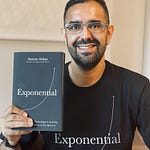Hi everyone,
Happy New Year to you all! 2021 isn’t (yet) what we would like it to be. Many of us find ourselves in hard lockdown again. Germany has just extended and strengthened its national lockdown as daily deaths are now skyrocketing. So has the UK. It looks like 2021 will continue to teach us not to take anything for granted 😟
For many of us there is nowhere to go but stay home (yet again). But to go out and expand your horizon, there will always be podcasts and books. That’s why this week my newsletter aims to give you both 🤗
🎧 You can listen to my conversation with Professor Mariana Mazzucato about “Rethinking the State” by using the player above ☝️ or, if you prefer, on Apple Podcasts or Spotify (and why not take this opportunity to explore my other Building Bridges podcasts?)
📚 Below is my list of 12 books about the future of work I read in 2020. For six years now I’ve read between 10 and 15 books about the future of work and organisations each year. I could read many more of course, but I also read some novels and essays not directly related to work.
I’m also a big practitioner of the great, ancient art of tsundoku (積ん読), i.e. acquiring reading materials but letting them pile up in my home without reading them. Tsundoku improves my life: just my looking at the said piles, I get all warm inside at the idea of future knowledge and adventure.
I hope this list will inspire you too 💡👇
#1 The Culture Map by Erin Meyer
As you may have noticed from reading my previous newsletters (namely “Navigating across cultures and getting ready for the future of work”), The Culture Map is a book that made quite an impression on me. I’m half-French, half-German, taught English in France, lived in the UK for 5 years, worked with Americans, and now I live in Germany, so of course I love studying cultural differences! Local cultures remain stubbornly divergent. And I’m convinced that learning to navigate between them is the skill of the future. For example, the best remote teams have integrated relevant lessons from intercultural teams.
#2 Feminist City by Leslie Kern
Not that long ago most people would have laughed at the idea that geography could be sexist or feminist. But today we accept that urban planning does have consequences on gender equality, and that the city is at the heart of many future of work issues. As the pandemic has made all too (terribly) visible: without proper childcare and healthcare infrastructures, we’re all doomed. Leslie Kern is a feminist geographer whose thoughts on urban activism and the future of cities bring fresh perspective to rethink the future of work with a gender lens. That’s why I did a podcast with her too 🎧
#3 The Value of Everything by Mariana Mazzucato
I’ve long been a big fan of Mariana Mazzucato’s work. The Value of Everything, her second book, felt quite personal to me. It questions the difference between value creation and value extraction, and the way economic theory failed us in that regard. How come so many of today’s “essential” workers (nurses, elderly care workers, nannies, teachers, and the like) also happen to be the least valued in society? I used to be a teacher in France: we were told again and again that we were a “cost” (while the private sector supposedly “created value”). Listen to my podcast with Professor Mazzucato in the player above☝️ or on Apple Podcasts 🎧
#4 Wordslut by Amanda Montell
What does a book about language and feminism have to do with the future of work, you may ask. Well, quite a lot. As you may remember from my 7 trends for 2021, “activism will force more people to share power”. And language is where it all starts. Before power can be shared, there are numerous linguistic battles to wage. In that book, Montell moves between history and popular culture to explore the relationship between language and society. Linguistic activism has already started to bleed into the world of work. Advertisers, recruiters and communicators can’t afford to ignore it!
#5 The New Long Life by Lynda Gratton & Andrew Scott
“Age is malleable” has become an essential component of my thoughts on the future of work. It’s funny how futurists focus so much on AI and so little on the one thing that we do know about the future: we’ll be older! Lynda Gratton & Andrew Scott have published two books on the “age of longevity” and its implications on education, careers, lives and our institutions. In The 100-Year Life, they explained that we’re moving away from the “three-stage life” (education, work, retirement) of the industrial age. In The New Long Life, they focus on the intersection between the longevity revolution & technological change. Listen to my new podcast with Andrew Scott 🎧
#6 Chez soi by Mona Chollet
This essay by Swiss journalist Mona Chollet may only be available in French and may have been written several years ago, it does deserve a good place on this list. Stuck at home during lockdown in 2020, many French readers turned to Chez soi for insights about the domestic sphere. I strongly believe that the home is the next future-of-work frontier. So Chollet’s “odyssey of domestic space” is a good place to start. This book conveys the wisdom of the “unjustly denigrated home” and asks extremely relevant questions such as “Who does the cleaning?”. (For those who don’t read French, I also recommend At Home: A Short History of Private Life by Bill Bryson.)
#7 The Uncertainty Mindset by Vaughn Tan
Here’s another book about which I wrote a lot (“The Uncertainty Mindset and the Future of Work”). Some books I squeeze out to the marrow. And this is one of them. For 10 years, Vaughn Tan, a professor of strategy & ex-Googler, watched how a group of highly innovative R&D food labs across the world of high-end cuisine approached innovation. Interestingly, the world of high-end cuisine underwent a paradigm shift that is full of useful lessons for many people and the world of work in general. There was a shift from efficiency as the main virtue to innovation. To understand what the uncertainty mindset consists in, listen to my podcast with Vaughn Tan 🎧
#8 Le génie lesbien by Alice Coffin
Alice Coffin is a French journalist and lesbian activist whose book Le génie lesbien caused a stir in France in 2020. Her book questions the notion of genius traditionally associated to men and highlights the contribution of women, especially lesbians, to human “genius”. It’s also a textbook about activism in a hostile environment (France really is quite sexist and lesbian-phobic). With a Fulbright scholarship, she studied activism in the US, methods of collective action and organising … and applied these lessons in France. As activism is part of my “7 trends”, this is a must-read!
#9 The Passion Economy by Adam Davidson
The “passion economy” is a concept that is all the rage in Silicon Valley and among creative freelancers. But Davidson’s book, The Passion Economy (2020), isn’t about creative content creators, it is about more “ordinary” small businesses “riding the waves of change”. The stories he tells encourage all of us to apply strategy to our individual work lives and find a niche to profit from our “passion” (this word shouldn’t intimidate you). According to Davidson, the first rule of the passion economy is to “pursue intimacy at scale”: “You may need to get creative and experimental and be willing to reach out to a lot of people—who might at first, seem uninterested in whatever it is you have to offer.”
#10 Extra Time by Camilla Cavendish
The ongoing demographic shift is such a big subject that it really does call for more than one book on this list. In Extra Time: 10 Lessons for an Ageing World, Camilla Cavendish, an editor at the Financial Times, “embarks on a journey to understand how different countries are responding to these unprecedented challenges.” She contests our taboos around age. “Our stereotypes are out of date”. “Unconsciously, our language turns (older) people into sub-humans, lesser beings”. But can we ask people to work longer while letting these stereotypes persist? If postponing retirement really means unemployment & poverty, it’s really a scam, isn’t it? (Rhetorical question all mine).
#11 Couples That Work by Jennifer Petriglieri
Let’s stop entertaining this fiction that work and family exist on different planes altogether! Families and couples are entities that shape individual careers and personal decisions. They’re also economic systems in themselves where individual roles must be defined and income and expenses balanced. (That’s largely why gender inequalities tend to accrue over time.) Jennifer Petriglieri’s Couples That Work offers insightful typologies, stories and analyses that help us see careers as the interconnected, interdependent, collective things that they often are. In our individualistic cultures, self-help books usually cater exclusively to the individual. Not this one.
#12 Yoga, une histoire-monde by Marie Kock
There are few industries that illustrate our changing aspirations and the growing importance of urban proximity services the way yoga does. And yet few books have been published about how yoga became a globalised, multi-billion industry with hundreds of millions of practitioners, millions of would-be instructors (some of whom aim to thus escape the corporate world) and predatory institutions in-between. Marie Kock, a French journalist (and yoga practitioner) dived into the history of yoga to write Yoga, une histoire-monde - De Bikram aux Beatles, du LSD à la quête de soi : le récit d'une conquête. It’s a fascinating read.
🇩🇪 ☃️ Germany has entered its hardest lockdown ever. Schools will remain closed at least until the end of January. I’m worried about what this means for my 12-year-old daughter who’s not been around children her own age for nearly a year. I’m worried about what this means for the mental health of many elderly people who live on their own (including my parents). This is all so f…… depressing 😭
🚀 For Nouveau Départ we’ve recorded new podcasts, among which: 🇬🇧 La place du Royaume-Uni dans le monde, 💸 Tout sur la fiscalité des multinationales, 💡Apprendre toute sa vie : la nouvelle norme … In 2021, give Nouveau Départ a try! (Students can get a discount is they ask for one 🤗)
👩💻 For Welcome to the Jungle, I wrote several new articles, but they haven’t been published yet. I’ll share them next time…
🎙️ As far as the Building Bridges podcast is concerned, I’m proud to say that 6 podcasts have already been published, with Leslie Kern, James Crabtree, Bruno Maçães, Mariana Mazzucato, Vaughn tan, and Andrew Scott. You can find all of them on Apple Podcasts. Subscribe to Building Bridges to receive the next one in your mailbox 🎧
Miscellaneous
😚 What the Pandemic Has Done for Dating, Sara Konrath, The Atlantic, December 2020: “What do I do? Do I ask him if he wants to, like, breathe the same air as me?” My friend describes this sharing-breath conversation as “basically the sex-without-a-condom conversation, but for kissing.” She talked it over with the man, and they decided to set up strict parameters for their bubble. They are now in a happy, committed relationship.
🇩🇪 It’s Easier for a Woman to Become Chancellor Than CEO in Germany, Raymond Colitt, Bloomberg, December 2020: Germany, whose Chancellor Angela Merkel is the longest-serving female head of state in the world, has one of the poorest records for promoting women in business in Europe. The quota bill -- asking companies to have at least one woman on their management boards -- will bump up the share of female executives to about 15%, taking Germany’s ranking to about 17 from 24 in the 27-member European Union.
⚕️ This Is Why Nursing Homes Failed So Badly, E. Tammy Kim, The New York Times, December 2020: When the pandemic is finally history, we’ll need to deal with all of this: the staffing shortages, low pay and lack of accountability —the many ways we have failed residents, family members and staffers. The awful truth is long-term care was designed to fail years before Covid-19.
May we all come out of this mess relatively intact! In the meantime, I’ll try and enjoy the snow ❄️















Share this post